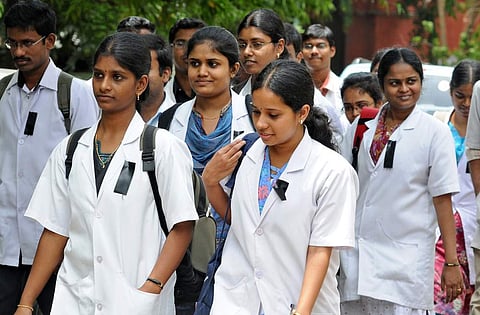

The Karnataka High Court has postponed the hearing of the pleas filed by in-service doctors of Karnataka to today, October 21. These in-service doctors are working in primary health centres and are seeking an increase in in-service quota in Dermatology and General Medicine courses.
The doctors claim that this year, the number of seats for in-service doctors has been reduced from 30 per cent to 15 per cent. The case had gone to court after Karnataka Examination Authority (KEA) released PG medical and dental course seat matrices for the 2022-23 academic year on October 10. The bone of contention was over Karnataka’s share of in-service postgraduate (PG) quota, which has been reduced this year. In 2021-22, the state had 392 PG medical in-service quota seats. This year, the number is only 206, according to the details of the petition filed in the HC.
The State government was to reserve 70 per cent of PG medical seats for non-service doctors and 30 per cent for government in-service doctors, according to the notification released by KEA on January 19, 2022. However, this year, the government had put aside 85 per cent of seats for non-service doctors and only 15 per cent for in-service doctors working in the Health and Family Welfare Department, autonomous institutions, Bruhat Bengaluru Mahanagara Palike (BBMP) and Boards and Corporations across the State, according to the details of the petition. In-service doctors challenged this reduction of seats in court on October 14.
In-service doctors speak
The seats were reduced without any notice, an in-service doctor who works in Karnataka told EdexLive on the condition of anonymity. “Many of us missed out on getting seats. If we do not get it this year then we will have to sit for the exam next year. But we do not have that much time to prepare all over again,” the doctor said.
The doctors also mentioned that within the 15 per cent seats reserved for in-service doctors, the seats are further broken down into other categories as well — Mahanagara Palike (6 per cent), Boards and Corporations (5 per cent), Autonomous Institutions (6 per cent) — for the PG Medical Degree, as per data available on the Karnataka HC website. “As a result, even this 15 per cent of seats are not enough. In other departments, even if there are not enough students, the seats have been increased. How is that fair?” the doctor asked.
Arjun Chinnappa, the Chairman of the Indian Medical Association (IMA), Medical Students Network (MSN) said that 100 more eligible candidates could get admission if the seats would be increased. “Government seats amount to around Rs 1 - 1.5 lakh which is still seven times lesser than what private medical seats cost. Many of these in-service doctors work in rural areas so it would deprive them of being able to afford government seats.”
Experts ponder
Medical practitioners and experts state that one of the incentives for in-service doctors to work in rural areas is the guarantee that they would be able to get the required PG degree. “But when they are not able to do this because there are less seats, it leads to a higher number of exits from the public healthcare system,” said Sylvia Karpagam, a public health doctor and a researcher.
This overall trend can be observed in the large-scale handover of public health facilities to private medical colleges, she added. “The effort to take away the incentives they are meant to get for going through hardships (as they come from marginalised communities) and work in rural areas, makes the system elitist,” she said.
In fact, other states like Tamil Nadu have advocated for a separate reservation for in-service doctors. The Madras HC in January this year upheld the State government’s decision to reserve 50 per cent of postgraduate medical seats for government doctors serving in villages and hill areas and also to provide them with incentive marks so that they compete even in the remaining 50 per cent seats allotted under the open category, according to reports. Akhila Vasan, a health activist, hails this step to retain doctors in the healthcare system but points out that Karnataka, on the other hand, dismantling it.
“If more people exit from the public healthcare system, people, including those from rural areas, will have to depend on private healthcare which charges exorbitant rates,” she said. If this were to happen, a rise in home deliveries could be observed which could lead to more neonatal, infant and maternal deaths, she pointed out.
Hearing today
According to the data available on the High Court’s website, the matter has been listed for item number 47 today for further hearing. The matter will continue to be heard by the bench comprising Justice Alok Aradhe and Justice S Vishwajith Shetty.
The KEA had earlier stayed the further rounds of the National Eligibility-cum-Entrance Test Postgraduate (NEET PG) counselling and admission with regard to the aforementioned case in the court.
The counselling has been stalled with immediate effect and till further notice, as the official notification by KEA states. Students who wish to access the notice can do so by visiting the official KEA website — cetonline.karnataka.gov.in/kea.
